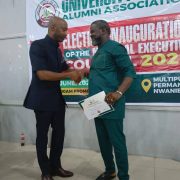Global Rights Equipping Nigeria’s Media for Conflict Battle Field
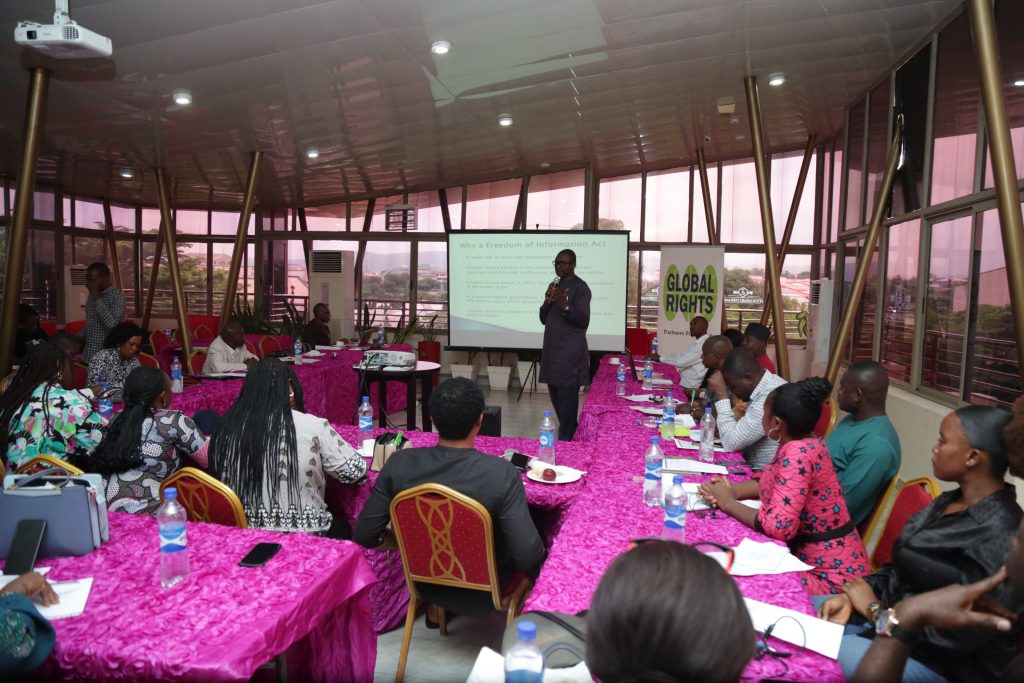
By Ekemini Simon
Nigeria in recent years has been inundated with several conflict sensitive issues. From insurgency in the North-East, banditry in the North-West and South West, Farmer-Herder conflict in the North-Central, Sit-at-home order in the South-East and oil theft and militancy in South-South.
These conflicts have in no little way affected negatively the peace, security, economic and social stability of Nigeria. It is not surprising then that the media has often found itself at the crossfire of these conflicts, mainly due to its roles in informing and educating the masses.
Yet the double-edged power of the media in either promoting peace or escalating conflict cannot be overemphasized.
Through its gatekeeping function, the media choose what the audience will read, see or hear. The media exerts its power to the extent of deciding what people will pay attention to and think about through its agenda-setting role.
Since journalists play a critical role in shaping public opinion and influencing conflict dynamics, it implies that their reportage on conflicts requires a responsible approach that considers the potential impact on social cohesion, peace-building, and the well-being of communities. To carry out this task effectively, it requires training and retraining.
It is on that backdrop, that Global Rights answered the clarion call when the organisation held a two-day training on “Conflict Sensitive Reporting” for 29 journalists and media practitioners selected across media houses in Nigeria.
The training, held from July 5-6, 2023 in Abuja had seasoned facilitators such as the Executive Director of International Centre for Investigative Reporting (ICIR), Dayo Aiyetan, Editor-in-chief of Premium Times, Mojeed Mosikilu, Former Chairman of Nigerian Human Rights Commission, Prof. Chidi Odinkalu, IT/Security Consultant, Hafez Yesufu and the Programme Manager, Global Rights, Edosa Oviawe.
What fuels Conflict in Nigeria
The Former Chairman of Nigerian Human Rights Commission, Prof. Chidi Odinkalu gave insight into why conflicts continue in Nigeria despite efforts to address it.
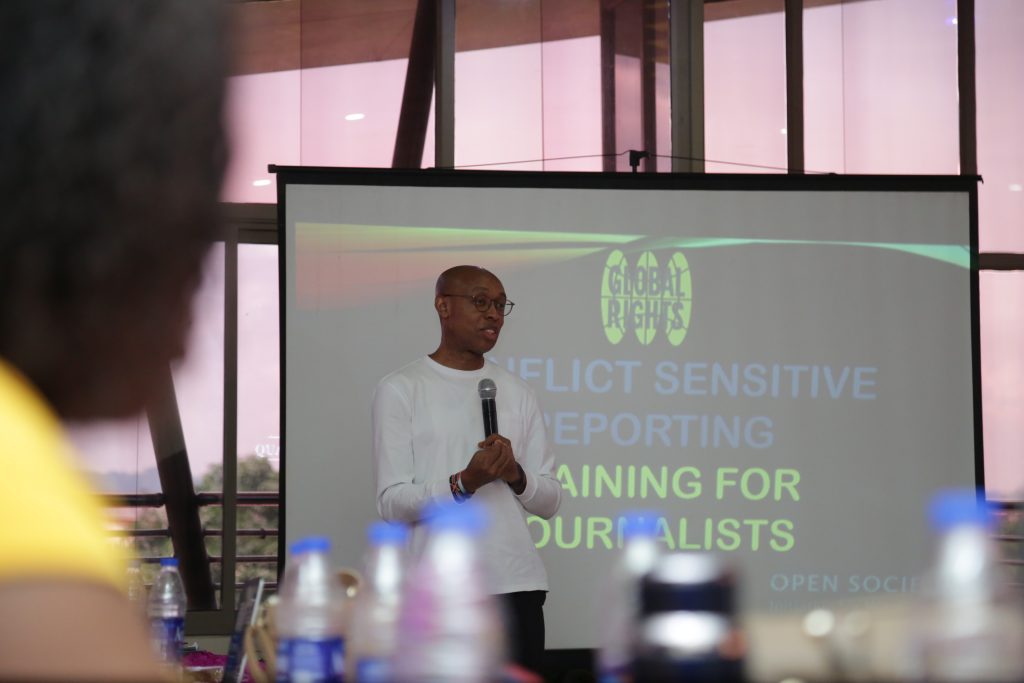
“Those who benefit from conflicts are unwilling to end the crisis in these regions because conflicts are a huge money spinner for some politicians who are the financiers”, he posited.
Odinkalu asked the Journalists to give deep thoughts to why Kaduna which is the most garrisoned city in Nigeria continues to have unending conflicts.
But the Programme Manager of Global Rights, Edosa Oviawe sees another angle to this. He notes that the struggle for power and poverty were part of the factors fuelling mass atrocities in the country.
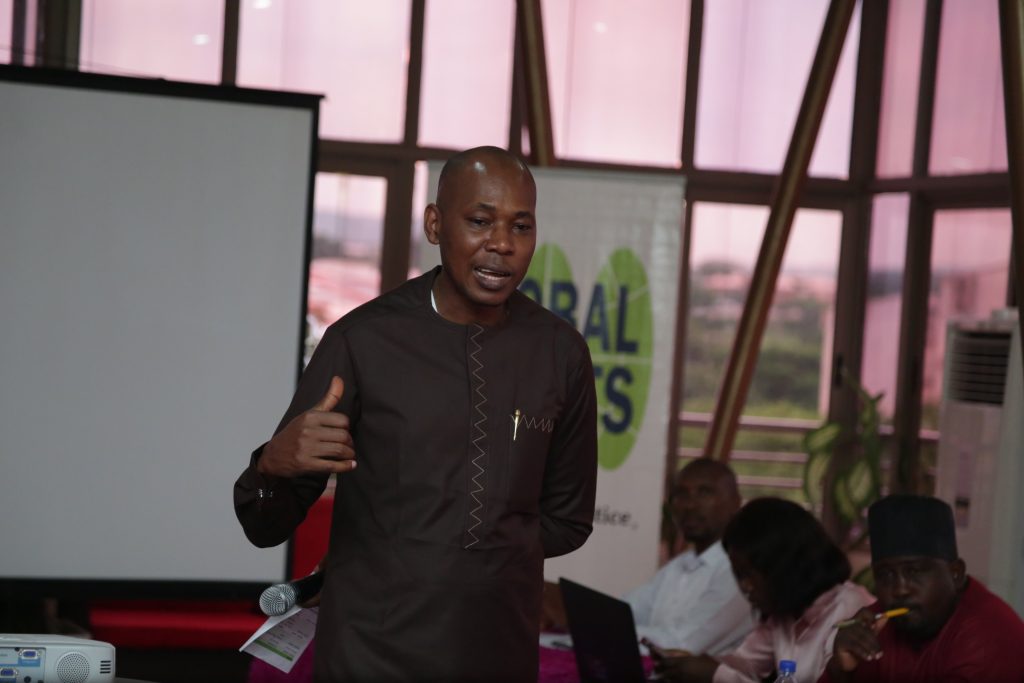
According to him, “Ethnic and religious divisions; political interests and power struggles; 20 million out-of-school children; 130 million multidimensionaly poor; 90 million absolutely poor; 33 per cent unemployment rate and over 50 per cent youth unemployment among others are drivers of mass atrocities in Nigeria.”
Nevertheless, what role does the government have to play? Oviawe said that section 14(2)(b) of the constitution of the Federal Republic of Nigeria 1999 places the security and welfare of the people as the primary purpose of government. Yet, what happens when the government fails in its mandate?
Global Rights’ Programme Manager insists that one of the key solutions lies in section 22 of the constitution of the federal republic of Nigeria 1999, as amended, which empowers “the press and other agencies of mass media to always uphold the accountability and responsibility of the government to the people”.
The Role of Journalists in Conflict Sensitive Reporting – Highlights from Aiyetan
Setting the tone for the training proper, Dayo Aiyetan of the ICIR exposed journalists to the rudiments of investigative reporting. According to him, ” Investigative reporting exposes wrongdoing and corrupt practices that negatively impact the populace.”
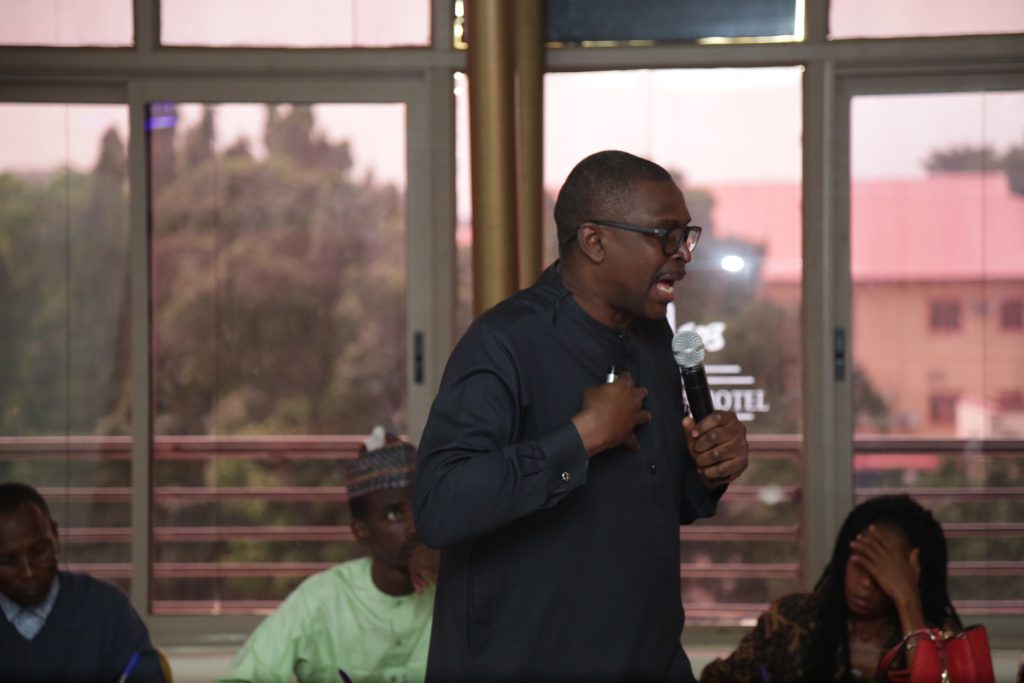
He noted that the role of the media should be like a bridge between the government and the people and investigative journalism is only concerned with matters that affect public good.
Aiyetan explained that Nigerian journalists need to have a firm grasp of the issues affecting the society before undertaking investigation.
Yet this is not enough as the ICIR Executive Director points journalists to qualities that great investigative journalists must possess; passion, initiative, curiosity, self-discipline, tenacity, determination, patience, good research skills, strong work ethics, sacrifice and commitment, detective investigative skills, team player, courage.
Be that as it may, journalists who report conflict sensitive issues must uphold some ethical standard which Aiyetan identified to include accuracy, fairness, responsibility, and balance/impartiality (reporting without bias).
Moving to the kernel of the training ” Conflict Sensitive Reporting”, Aiyetan identified four stages of conflict in Nigeria to include latent, emerging, manifest non-violence and violent conflict.
On latent conflict- example includes electronic voting, civilian Joint Task Force, and appointment of National Security Adviser.
Examples of emerging conflict identified are the citizenship and the ownership of Lagos while #ENDSARS and restructuring issues fall under manifest non-violent Conflict. He identified herdsmen crisis and banditry as violent conflict.
But what role do journalists have in the face of all these four categories of conflict?
The Executive Director of ICIR pointed out that the role of journalists in conflict is objective reporting, analysing – beyond reporting, providing a communication channel between conflicting parties, building confidence, puncturing misconceptions, falsehoods, and propaganda and maintaining a balance of power. But there’s more work for the journalist in terms of where to find data sources for conflict reporting.
Resources for Journalists undertaking Conflict Reporting – Highlight from Mosikilu
Speaking on why data matters in reporting crises and atrocities, the Editor-in-chief of Premium Times, Mojeed Mosikilu noted that data show trends, maps and patterns that tell whether violence has increased or decreased in a location or a region and how that relates to conditions such as migration.
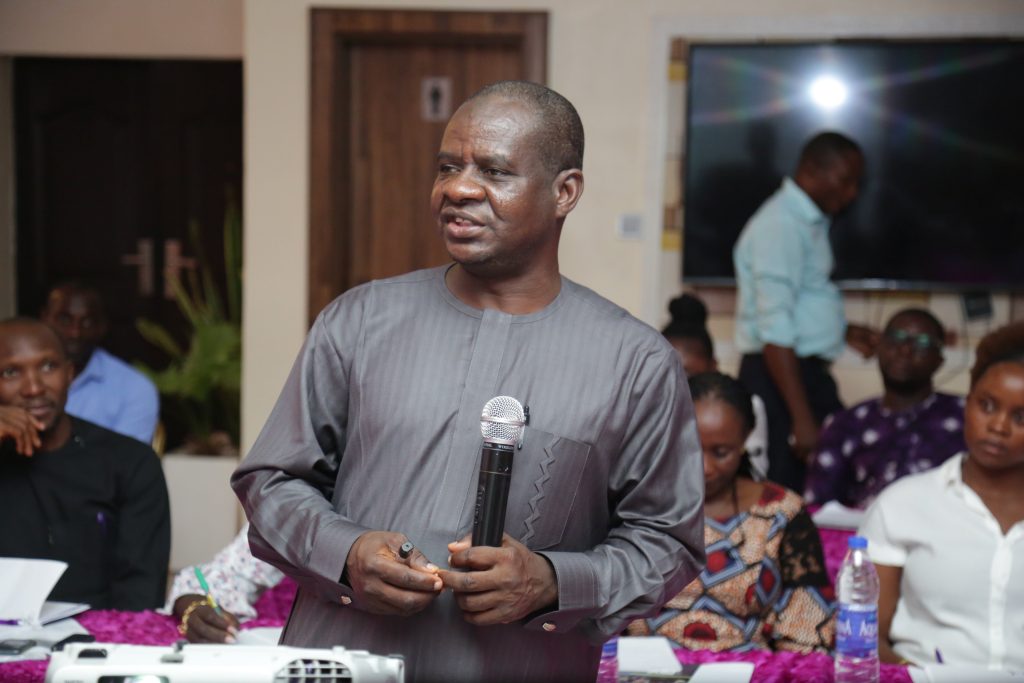
He highlighted sources of data for crisis and atrocity reporting to include government, law enforcement, local aid organisations, personal research, data collection projects, scholarly studies, international Non-governmental organisations, United Nation agencies, local media, and affected communities.
However, for journalists to make their story credible after accessing documents or information from the sources highlighted above, Mojeed said such documents must be verified.
To verify documents, he said journalists must be skeptical, check and verify claims, hear all sides and provide context, and develop skills to analyze huge materials.
Other things the Premium Times Editor-in-chief mentioned included the need to be literate in research, know how to authenticate or fact check documents and most importantly always be ethical. Be that as it may, the fact remains that conflict sensitive reporting is a risky endeavour for journalists. How then do they wriggle them out of security threats while carrying out their work?
Ensuring Personal Safety When Reporting Conflict Situations
Information Technology/ Security Consultant, Hafez Yesufu who facilitated this session noted that journalists should be mindful of their safety by adhering to usage of safety kits while covering conflict zones.
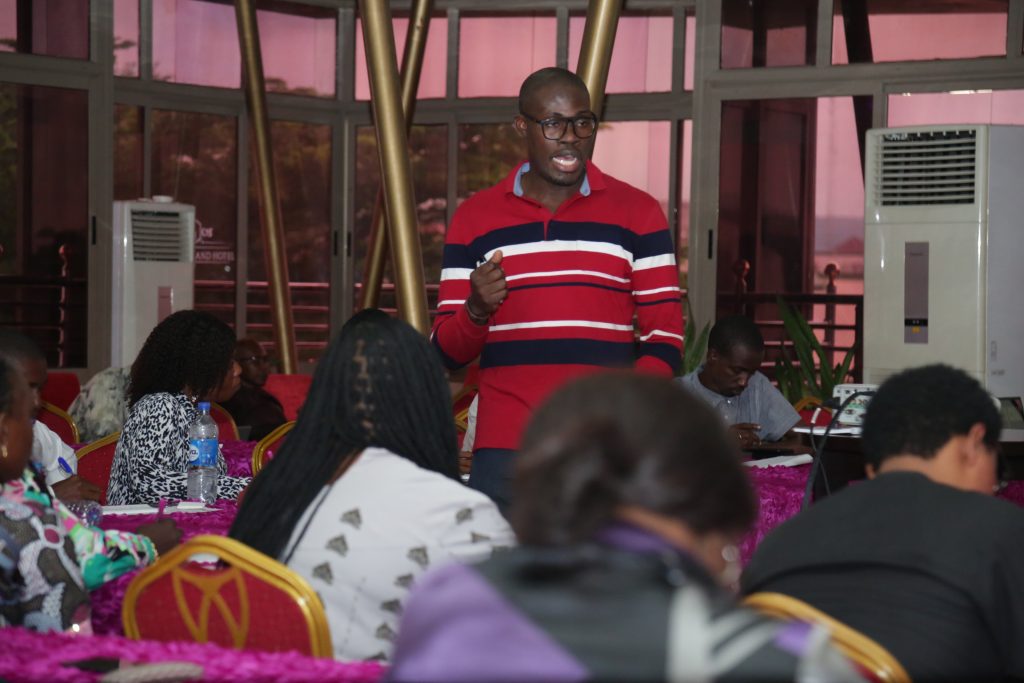
He said some factors that enhance safety for journalists include critical thinking, challenge the thinking, identify the key drivers, situational awareness, personal awareness, cultural awareness and third person awareness.
Working with the ‘Unusual’ suspects After the Training
The Programs Manager of Global Rights, Edosa Oviawe who facilitated the session “Working with Civil Society and the ‘Unusual’ suspects” allowed the trainees the time to congregate as groups over the possible conflict issues they can undertake after the training.
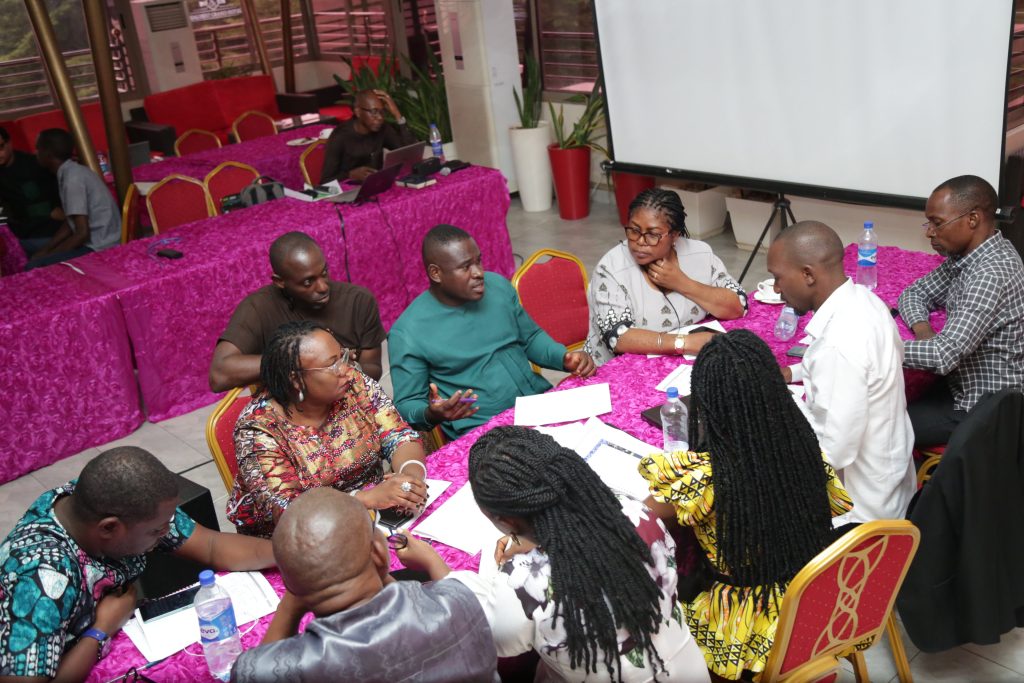
As a result, the three groups resolved to investigate conflict sensitive issues as the outcome of the training. These issues included: Sit-at-home order in the South-East and how it impacts the people and economy of the region, Farmer-Herder Conflict in Plateau State, and Banditry in the North-West among other issues.
As the clock ticks after the training, it is hopeful that the 29 journalists drawn from various states of the federation will deploy the needed skills they have been equipped with from the Global Rights Conflict Sensitive Reporting Training to investigate relevant issues that will contribute to national security and nation-building.







